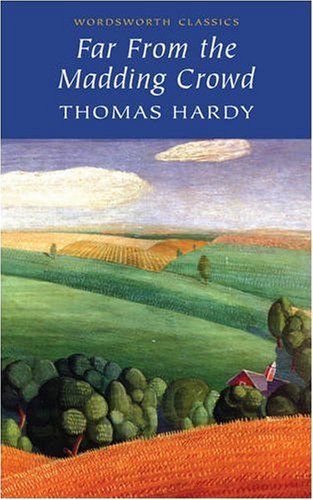 It happened by the grace of God that Joseph Santangelo won his wife in a card game.
It happened by the grace of God that Joseph Santangelo won his wife in a card game.
Francine Prose, Household Saints
That's why novels that begin with a descriptive passage can be so disappointing. We read novels for the stories, and the sooner those stories get started, the better.
 Yet there are exceptions. Sometimes descriptive opening passages can be effective in setting the scene and and pulling the reader into the narrative. Thomas Hardy, one of my favorite authors, had a gift for description, and some of his descriptive opening lines were among his best. Here's how he opens The Return of the Native:
Yet there are exceptions. Sometimes descriptive opening passages can be effective in setting the scene and and pulling the reader into the narrative. Thomas Hardy, one of my favorite authors, had a gift for description, and some of his descriptive opening lines were among his best. Here's how he opens The Return of the Native:A Saturday afternoon in November was approaching the time of twilight, and the vast tract of unenclosed wild known as Egdon Heath embrowned itself moment by moment. Overhead the hollow stretch of whitish cloud shutting out the sky was as a tent which had the whole heath for its floor.
Then there's his description of Farmer Oak with which he begins Far From the Madding Crowd:
 When Farmer Oak smiled, the corners of his mouth spread till they were within an unimportant distance of his ears, his eyes were reduced to chinks, and diverging wrinkles appeared round them, extending upon his countenance like the rays in a rudimentary sketch of the rising sun.
When Farmer Oak smiled, the corners of his mouth spread till they were within an unimportant distance of his ears, his eyes were reduced to chinks, and diverging wrinkles appeared round them, extending upon his countenance like the rays in a rudimentary sketch of the rising sun.Just as good is Dashiell Hammett's description of his main character at the beginning of The Maltese Falcon:
Samuel Spade's jaw was long and bony, his chin a jutting v under the more flexible v of his mouth. His nostrils curved back to make another, smaller, v. His yellow-grey eyes were horizontal. The v motif was picked up again by thickish brows rising outward from twin creases above a hooked nose, and his pale brown hair grew down -- from high flat temples -- to a point on his forehead. He looked rather pleasantly like a blond Satan. He said to Effie Perine: "Yes, sweetheart?"
One of literature's best descriptive opening passages must by John Steinbeck's first paragraph of Cannery Row:
 Cannery Row in Monterey in California is a poem, a stink, a grating noise, a quality of light, a tome, a habit, a nostalgia, a dream. Cannery Row is the gathered and scattered, tin and iron and rust and splintered wood, chipped pavement and weedy lots and junk heaps. sardine canneries of corrugated iron, honky tonks, restaurants and whore houses, and little crowded groceries, and laboratories and flophouses. Its inhabitants are, as the man once said, "whores, pimps, gamblers, and sons of bitches," by which he meant Everybody. Had the man looked through another peephole he might have said, "Saints and angels and martyrs and holy men," and he would have meant the same thing.
Cannery Row in Monterey in California is a poem, a stink, a grating noise, a quality of light, a tome, a habit, a nostalgia, a dream. Cannery Row is the gathered and scattered, tin and iron and rust and splintered wood, chipped pavement and weedy lots and junk heaps. sardine canneries of corrugated iron, honky tonks, restaurants and whore houses, and little crowded groceries, and laboratories and flophouses. Its inhabitants are, as the man once said, "whores, pimps, gamblers, and sons of bitches," by which he meant Everybody. Had the man looked through another peephole he might have said, "Saints and angels and martyrs and holy men," and he would have meant the same thing.If the purpose of the first paragraph is to make a person want to read the second, then each of these openings succeed magnificently.
No comments:
Post a Comment